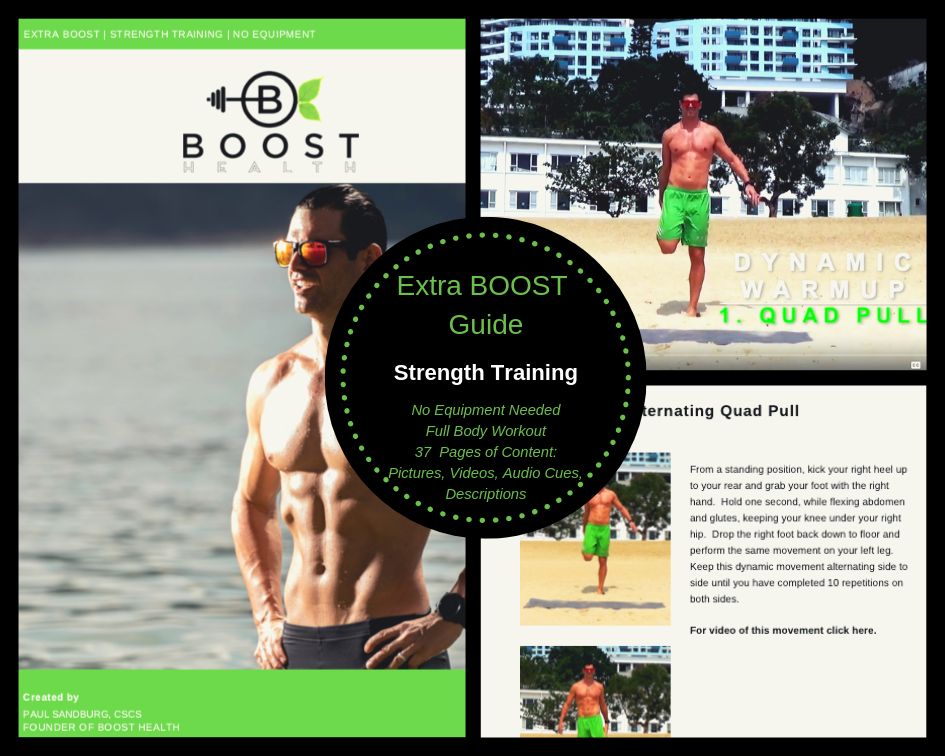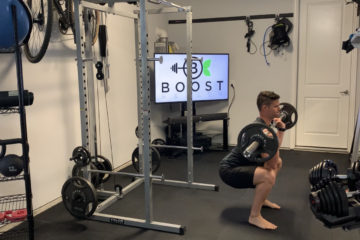
I recently had one of my corporate wellness clients ask me to do a presentation on sleep and stress as that was a common theme issue with folks in their office. I agreed and started digging into the research, like I always do, to make sure I was bringing the latest and greatest. I started noticing a lot of crossover with these and the topics of routine and productivity. I realized that they all actually work in feedback loops with each other. According to the businessdictionary.com a feedback loop is defined as “a channel or pathway formed by an ‘effect’ returning to its ’cause,’ and generating either more or less of the same effect.” Consider productivity and stress for example. Good productivity generates lower stress, which generates more productivity, and so on. This would obviously be a good feedback loop to be stuck in. But you can also get stuck in a poor feedback loop. Using productivity and stress again, you could have a high amount of stress which could cause low productivity, which in turn could cause more stress, and so on. Interestingly you can apply this type of better makes better and worse makes worse feedback loop to any arrangement of the topics of sleep, stress, productivity, and routine. With this in mind I will cover the latest and greatest research in each of these topics with regard to your health. As we go through each you will notice the common ground and why getting one area under control can help prevent a domino effect in other areas.
Sleep
Even as we are learning more and more about the importance of sleep on overall health and longevity, it seems to still be grossly underestimated. I get lots of giggles when I say my bedtime is 8:30. Why is that? Why is it silly or uncool to go to bed early? Nobody laughs when I say I woke up at 5am. That is tough. That is cool. I think we need to remove this shame around getting to sleep early and getting enough sleep. The old saying, “I will sleep when I am dead” is similar to the Marlboro man ads in my opinion. We used to think that they were tough and cool but now realize they are killing us. Sleep is important, sleep is cool, and as we will discuss, more quality sleep will make you live longer.
2 Sleep Systems
Before we dive into all the amazing research on sleep to get you inspired to sleep more, it is important to understand how our sleep systems work. 2 major systems in our body cause sleepiness: homeostatic and circadian.
The homeostatic system basically works on time that you are awake creating more sleepiness. Your brain builds up a chemical called adenosine that makes you sleepy the longer you go without sleep. Basically being awake longer creates a drive to get more sleep and balance out your system. It should be noted that caffeine temporarily blocks adenosine, hence the lack of sleepiness when you drink coffee. Also exercise increases adenosine. As many of you know I recommend getting some sort of exercise in daily, and now we can add good sleep quality to the list of reasons why.
The circadian system works with the sun’s day-night cycle and it is linked with our biological rhythm. Biological clocks are part of this circadian system as our innate timing device. These clocks are found in nearly every tissue and organ in our bodies for regulating timing and rhythm. All of these individual clocks are managed by a master clock in our brain which is a large group of 20,000 neurons. The main cue for influence of our circadian rhythms is light. When the master clock perceives less light through the biological clocks it will tell the brain to make more melatonin, which is a hormone that makes you sleepy.
We Are Like Plants
Dr. Chris Winter wrote an excellent book on sleep called The Sleep Solution. If you struggle with sleep duration or sleep quality it is a fantastic resource. In the book he talks about a study on flowers, light, and rhythms. You see we aren’t the only creatures that have circadian rhythms. Most living things have circadian rhythms, even down to the microbe level. The study looked how flowers would respond in a greenhouse with controlled light. When the flowers were on a 12 hours of light, 12 hours of dark cycle they thrived. However, when the flowers were random timing of light and darkness they died, even if the total light was 12 hours in total. It seems that plants need a natural cycle of light to prevent disruption of their rhythms. Humans are similar. We need to follow a light and dark cycle and get at least 8 hours of sleep during the dark cycle.
Sleep Stages
Stage 1 – Very light sleep, systems start slowing down (several minutes)
Stage 2 – Light sleep, systems slow more, body temperature drops and eye movements stop. Spend most time here.
Stage 3 – Deep sleep. Need this to feel refreshed. Longer in first half of sleep. Heartbeat and breathing slow to their lowest levels. Your muscles are relaxed.
Stage 4 (REM) – Begins ~ 90 minutes after falling asleep. Your eyes move rapidly from side to side, breathing becomes faster and irregular, heart rate increases, and arm and leg muscles may even become temporarily paralyzed. Most dreaming here. Less REM with age.
My screenshot of sleep stages
Sleep Research
If you are not interested in all the research and just want the bottom line, then just make sure you get 8 hours of high quality sleep every night. For those that are not yet convinced sleep is important, or just want to reinforce your already good sleeping habits, let’s dig in.
Matthew Walker, Professor of Neuroscience and Psychology at the University of California, Berkeley, recently did a Ted Talk on sleep and brought forward some very interesting studies. He noted that the deep sleep stage seems to be when we move our memories from short term storage to long term storage. It seems that making sure you spend enough time in deep sleep is super important from a cognitive standpoint. He also mentioned some alarming information on lack of sleep correlated with increased disease including a higher chance for several types of cancer and 70% reduction in immune cell activity when only getting 4 hours of sleep.
Dr. Chris Winter makes a good case in The Sleep Solution that sleep isn’t just simply flipping the off switch for our bodies, but rather a series of amazing and critical processes are taking place in every system in our body. He discusses how the glymphatic system in our brains removes waste and this process works best when we are sleeping. One key waste product is a protein called amyloid beta, which accumulates in the brains of Alzheimer’s patients. Low duration and low quality sleep impairs your ability to get rid of toxic waste that builds up during the day. An interesting note was that this waste removal seems to work best when sleeping on your side.
Apparently 6 hours doesn’t seem to be enough sleep duration. A 2013 study in Proceedings of the National Academy of Sciences of the United States of America found that participants who were limited to 6 hours of sleep each night for one week had surprising results in their gene expression. Genes for immunity were turned off and genes associated tumors, inflammation, and stress were turned on. It is amazing that this happened in just 1 week!
Apparently 7 hours doesn’t seem to be enough sleep either. A 2015 study in Epidemiology that looked at over 1 million Chinese subjects found higher levels of obesity in those subjects that had fewer than 7 hours of sleep per night.
Even 1 night of disrupted sleep can cause cellular issues. A 2016 study in Brain, Behavior, and Immunity, found that subjects that had poor sleep even for just 1 night had signs of cellular damage and aging.
8 hours of sleep seems to be the minimum requirement from an immunity and cognitive function standpoint. A 2009 study in Archives of Internal Medicine found that participants with 7 hours of sleep were nearly 3 times more likely to develop a cold than those with 8 hours or more of sleep. In the study 153 healthy men and women were given rhinovirus (common cold) via nasal drop. A 2003 study in the Journal of Sleep Research found that any sleep duration below 8 hours caused a restriction in brain operational capacity.
Better Sleep Tips
There are tons of tips for better sleep duration and quality. Below are the most helpful and important ones in my opinion, in no particular order.
Keep a routine – Go to bed at the same time every night and wake up at the same time each morning. This applies to weekdays, weekend days, and holidays. Remember the aforementioned flower greenhouse experiment? We need consistency of light/night cycle to perform optimally just like the plants do.
Keep cool – Studies have shown we fall asleep and stay asleep best when our environment is cool. Aim for about 65 degrees F / 18 degrees C.
Read a book – Reading the kind with paper (no screens) can help induce sleepiness.
Remove stigma of lazy/not tough – It is cool and healthy to go to bed early and get enough sleep.
Don’t stay in bed if can’t sleep – Studies have shown that your brain will associate your bedroom with a state of unrest if you spend too much time in bed trying to fall asleep. Go do something else outside of your bedroom and come back when you are sleepy.
Track it – There are tons of gadgets available to track sleep at night. It is very interesting a fun to see how you flow through the different stages of sleep. These devices also keep you honest about how much total sleep you are really getting.
Bed time alarm – Pretty simple stuff here but I think it is really helpful. Set your alarm about 15 minutes before you want to go to bed and do your normal routine of brushing teeth, change clothes, etc. Don’t talk yourself into staying up a little later. Just go when the alarm says too.
Avoid light at night – Remember how the master clock perceives light through the biological clocks in the body and tells the brain to make more melatonin (sleepy hormone) if dark? Your TV, phone, and other random lights (modem, air conditioner, etc.) can trick your clocks to thinking it is daytime and throw off your melatonin production. Keep away from lights as much as possible and if you must be on a phone or computer use blue light blocking glasses.
Stress
Dealing with stress is very individualistic. Different tactics work for different people and stressors can be situation specific. For example I am a stressed out nervous traveler, while my wife is cool as a cucumber. There is an excellent TedEd video on how stress affects your body by Sharon Horesh Bergquist. It notes that stress can be good in the short term like if we need to run away from a bear. In a stressful situation your body’s adrenal gland releases stress hormones cortisol, epinephrine (adrenaline), and norepinephrine, which increase heart rate and blood pressure. These are good tools to help you get away from that bear in the short term, but they are bad if activated too often or too long. Imagine if you were running away from a bear for hours and hours everyday.
Over time chronic stress can cause hypertension, the elevated cortisol levels can cause plaque build up in blood vessels, digestive issues can occur, and visceral fat (the fat around your organs) can be increased. On top of all that, chronic stress can harm immune cell function and even shorten your telomeres. Short frayed telomeres are correlated with chronic disease while long telomeres equal a longer life.
Be Positive
The good news is, it seems we can have some control. In Kelly McGonigal’s book, The Upside of Stress, she discusses that our mindset about stress can actually control how our body responds to it. She highlights numerous studies to support this. One particularly interesting 2010 study at Harvard showed less vasoconstriction of blood vessels when participants were told that stress symptoms such as heart rate and sweat will help them perform better on a graduate school entrance exam. On top of their body responding better to stress they even performed better on the exam!
Be Grateful
I have discussed the health benefits of gratitude journaling several times and how I do it each morning after I drop the kids off at school. Apparently we can add stress reduction to the list of reasons to do a gratitude journal. According to Robert Emmons, professor of psychology at UC Davis, there is a mounting data set from his studies and others that show numerous health benefits of recognizing what we are grateful for on a consistent basis. Included in his data set are several key points about stress. The first is that just 2 weeks of consistent gratitude journaling showed a 28 percent reduction in perceived stress. Another is that stress hormone cortisol levels can be reduced by 23 percent with gratitude efforts.
Meditate
I used to struggle to get into a groove with meditation. Then I started thinking about emotions as passing traffic. Andy Puddicombe, co-founder of the Headspace meditation app, narrates a very helpful animated video on meditation that really resonated with me. In this video he describes how it can be helpful to think of any emotions that arise while meditating as passing traffic. Such as a car with anger, sadness, or nervousness. Instead of getting in the car for a ride you just notice it and let it pass you by.
Once you get into a rhythm with meditation it does seem to help with stress. A 2018 study completed by the US Army Research laboratory and the University of North Texas found that meditation reduced stress and improved cognitive performance in soldiers. They used heart rate variability to measure stress.
Track It
Speaking of heart rate variability (HRV), this is an easy way to track how stressed your body really is. Sometimes we are stressed and we don’t even realize it. I discuss how to use HRV to manage workout intensity on a daily basis in my article on How to Listen to Your Body. HRV helps us understand how recovered autonomic nervous system is from a stress perspective and this is useful for training but it is also very useful in just understanding how well your body is responding to all stressors. If your HRV score is in the tank it may be your training volume, but it could also be how you are dealing with other stress such as emotional, or it may be both!
Productivity
David Allen’s book Getting Things Done, truly changed the way I approach my work and personal tasks and is my favorite productivity resource. There are certainly lots of hacks, methods, and applications for productivity available to us today, but David’s system and mindset around productivity really resonated with me. Several years ago I implemented the basic tactics he discusses and I have been able to stick with them to this day. The guiding principle behind his work is that our brains can only hold on to so much information at once and as such we need to capture and systematize our ideas to create space. Below is a summary of some David’s main concepts that have helped me.
Capture Ideas
David suggests that we shouldn’t have any new ideas more than once. There are tons of apps for idea capture and, of course, good old pencil and paper work too. I like Evernote because it is cloud based so I can open and save anywhere. The app also works with phone dictation so I can capture on the go. The idea is that if you aren’t worried about remembering new ideas or to do’s, then you will have capacity for creativity and new opportunities.
Next Action and Due Date
Once the ideas are captured it is time to plug them into some sort of system along with their next action item and a due date. For example, maybe you captured “start presentation for ABC client”. When plugging this in to your project spreadsheet, or whatever system you use, you would actually add an action step and due date to that step. Maybe it would be “create slides on stress” due June 5th. For me personally this takes me from confused and overwhelmed mode to a much more organized, calm, and productive state. Yes it takes a bit of time to set this up with all of your projects but if you stay on top of it daily, thereafter, it is a really helpful system. It works great for work and personal tasks. You basically treat all of your work and personal tasks like project management.
2 Minute Rule
The 2 minute rule works well when doing input tasks like reviewing email. If you can do the task in 2 minutes or less you simply do it right away. This will save you time trying to figure out plugging it in and an assigning action and due date. This works well if you set aside specific time in your day to do input and output tasks. I like to do output work like creating presentations or writing a new workout program early in the day when research has shown we are the most productive. Then in the afternoon I will schedule in time to do input tasks and knock off any that take 2 minutes or less. This is a great way to stay on top of easy to complete items and helps you stay above water with your overall project task list.
Routine
We will finish out the topics with routine as it ties everything together nicely. Remember the feedback loops that sleep, stress, and productivity work in with each other. For example more productivity creates less stress which creates more productivity, or less productivity creates less sleep which creates less productivity. Routine can be added to any one of these topics into a positive or negative feedback loop. For example a better routine creates more productivity which creates a better routine. Below are some absolute musts in my opinion for your daily routine. You will notice some overlap in tactics to improve sleep, stress, and productivity, and that is because they are really closely tied to the success or failure of one another. This is a list of musts for a daily routine that I think are most important.
Same Time Daily
Go to bed and wake up at same time on every day that ends in “day”. Monday, Tuesday, Saturday, Holiday…you get the idea. Remember the flower that needs the same light/night cycle. We operate on the same type of light cue based circadian rhythm.
Get 8 Hours of Sleep
Hopefully all the aforementioned data on not getting enough sleep made this one a no brainer.
Exercise Daily
Among the plethora of health benefits from exercise are better sleep, more productivity, and less stress. I like to recommend 3 days strength and 4 days of cardio each week. Just do something every day. Every workout doesn’t have to be, nor should it be, a super intense session. Maybe it is a family hike or chill yoga session. Just do some sort of movement daily.
Hardest First
When you start your work day in the morning, do the hardest output task (creating something) first. Research has shown we are most productive early in the day so don’t waste that time in email jail.
Capture Ideas and Update
We discussed why it is important to get ideas out of your head and stored somewhere. Get in a habit of doing this daily, anytime you come up with something new. Update your system (spreadsheet, app, etc.) daily to make sure you are inserting action steps and due dates.
Track Your Heart Rate Variability
Use this quantifiable overview of your stress daily to see how well you are managing. Factors that can improve or hinder your score include sleep, stress, exercise, nutrition, etc.
1 De-Stress Tactic
Do at least 1 de-stress strategy daily such as meditation, gratitude journaling, or exercise. Or, even better, do all 3.
Link to Full Body Strength Training Guide here. No equipment required!
Please click the link below to your favourite podcast app to listen in or watch the show on BOOST Health TV

Extra BOOST Guide | Strength Training | No Equipment
37 pages of pictures, videos, audio cues, and descriptions. Includes dynamic warm up, full body workout, and cool down.
Podcast: Play in new window | Download
Subscribe Apple Podcasts | Google Podcasts | RSS







